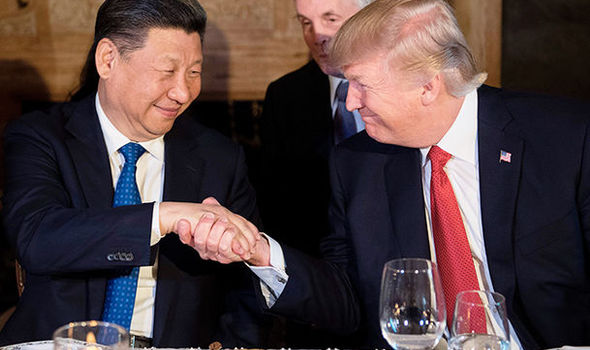
Mr. President, can we have 10 minutes of your time?
Engagement, listening, and freely exchanging views can change minds. Just ask President Trump.
When he met last week with President Xi Jinping of China (shown in photo at top), President Trump said China “could easily take care of the North Korea threat,” the Wall Street Journal reported. “But then Mr. Xi explained the history of China and Korea, Mr. Trump said. ‘After listening for 10 minutes, I realized it’s not so easy.'”
From this remove, we can’t know whether the President has ears to hear the strong arguments for keeping and growing the diplomatic and economic opening he inherited from the Obama administration.
But if he did listen, we think he could see the link between what he promised on the campaign — that he could get a “better deal for the Cuban people, the Cuban/American people and the U.S. as a whole” — and the existing policy, which is already delivering the goods for the United States and the Cuban people.
So, taking a page from President Xi’s playbook, we’re asking President Trump to take at least 10 minutes to consider the strongest arguments we and other advocates are making for pursuing the policy of engagement with Cuba now.
You can read the letter to the National Security Council sent by the Center for Democracy in the Americas (CDA) about President Trump’s Cuba policy review here.
Governor Phil Bryant of Mississippi had a message for President Trump when he returned from his visit to Cuba this week. He urged him to see past the narrative of Cuba from the 1960s to “get that dialogue going in a very positive manner.”
When Gov. Bryant speaks — a Republican, rated the fifth most conservative governor in the U.S., who stuck by his endorsement of President Trump last fall — it’s reasonable to think he’ll be heard.
This week President Trump also heard from a renowned group of retired U.S. military flag officers. In a letter to the White House, they said, “The continued normalization of relations with Cuba is important to the national security of the United States and to the stability of relationships in the Western Hemisphere.” They also argued that keeping the reforms that allow greater travel and trade, “will empower the Cuban people to better determine their own futures.”
President Trump, who is famously deferential to his military advisers, should carefully consider what these highly decorated military leaders said about how we can best protect U.S. security and realize our humanitarian goals for the Cuban people.
How about negotiating strategy? Professor Bill LeoGrande and Marguerite Rose Jiménez, writing in The American Conservative, offer clear, smart, and honest advice informed by history: “The idea that the best way to support a political opening in Cuba is for the United States to demand human-rights concessions as a condition of engagement is not just a bad negotiating strategy. It also represents a fundamental misunderstanding of how the United States can most effectively influence Cuba’s political future.”
“Rather than make demands Cuba is sure to reject,” they argue for a policy that “aims to create conditions that provide Cuban leaders with self-interested reasons to allow greater political and economic freedom.” In addition to citing evidence that current policy is realizing important goals – from growing availability of Wi-Fi hotspots to the greater latitude for U.S. diplomats to meet Cubans from across the political spectrum – they echo an argument made by the generals: “Building bilateral economic ties creates the incentive for Cuba to maintain an open flow of people and ideas, and to be more responsive to U.S. concerns on a whole range of issues, including human rights.”
The promise that favorable conditions created by engagement with Cuba could produce better results than the previous policy of estrangement is being fulfilled every day. Our good friends at Cuba Educational Travel released this survey which shows how “U.S. travelers are engaging directly with Cuban citizens, speaking to them about economics, internet, technology and other key issues at a critical moment of transition on the island” thanks to the recent reforms.
It was no accident that Dr. Maria Grazia Giammarinaro, UN special rapporteur on trafficking in persons, was able to spend five days in Cuba discussing human rights and human trafficking with Cuba’s government. It was the result of bilateral diplomacy with Cuba, affirmations by the U.S. of respect for Cuba’s sovereignty, and decisions taken by Cuba’s leadership that contributed to the climate that made her trip possible and effective.
In this space we have expressed pessimism about the Trump administration’s Cuba policy review and whether his appointments and previous statements signal a preordained result. At the same time, silence is not a strategy. The most consequential decision that the administration can make to advance U.S.-Cuba relations is to understand that a political and economic transition is underway, and to pursue a policy that will support that progress in the years ahead.
If we had 10 minutes, CDA would tell the President about our trips to Cuba, including the most recent visit with Republican Members of Congress, and the conversations we’ve had with Cubans inside and outside the government. “All of them,” as we said in our letter to the NSC, “expressed their support for a continuation, even an expansion, of U.S. policy so they have the greatest latitude and opportunity to build a future for themselves in Cuba.”
If the President would listen, this is what we’d say. It may not work. We’re not naïve. But if it worked for President Xi, why not us?
(From Cuba Central)

